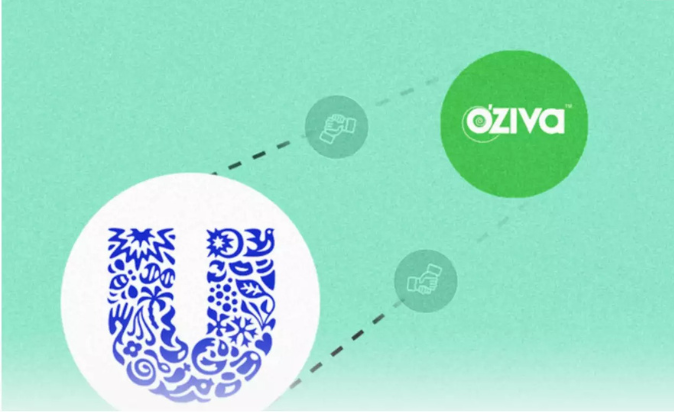HUL and Ozivia discusses about Nutrition
- Dec. 8, 2022
- FMCG HORECA BUSINESS

The discussions to buy Hindustan Unilever (HUL)
Oziva, a plant-based supplement brand, according to various sources, signaling the start of what might be a wave of consolidation in the direct-to-consumer (D2C) brand industry.
Oziva competes with Amway, GNC, and unbranded supplements from Indian pharma businesses, selling nutrition and fitness items in areas such as women's health, skin, hair, men's health, and general wellbeing.
According to those familiar with the project, Oziva was looking for a value of Rs 400-500 crore, which might be a stumbling point for a deal with HUL. Oziva, founded in 2016 by Aarti Gill and Mihir Gadani, has contacted other consumer goods businesses such as Dabur and Tata Consumer, but those conversations were halted owing to a value mismatch.
"They've been in advanced conversations with HUL, but their sales statistics have declined from their high, which may damage the value and overall deal," a source familiar with the talks said.
In an interview with ET last year, the business said that its annualized sales had quadrupled from the previous year and that it aimed to reach Rs 500 crore over the next three years. According to sources familiar with the company's operations, Oziva was clocking approximately Rs 12 crore in monthly sales and would have likely concluded at Rs 100-150 crore in annual revenues for the fiscal year ending March 2022.
"They've been in advanced conversations with HUL, but their sales statistics have declined from their high, which may damage the value and overall deal," a source familiar with the talks said.
The six-year-old business has received $17 million in backing from venture capital firms such as Matrix Partners and Eight Roads Ventures. According to Tracxn, a data platform, it was valued at $80 million when it secured funding last year.
When ET contacted HUL and Tata Consumer, they stated they couldn't comment on market speculation, while Oziva said the information was "baseless and false."
FMCG companies are interested in direct-to-consumer branding.
According to a consumer investor, typically FMCG behemoths, particularly in global markets, have been acquirers of D2C brands if the sectors are a development area for them. Though companies such as HUL have not made significant inroads into these specialized brands in India,since the majority of online-focused firms are still modest in size
In reality, many of these so-called D2C firms have recently diversified to offer via brick-and-mortar channels in order to increase sales.
Marico, ITC, and even HUL have been investing in D2C brands that got significant traction during the pandemic, when internet purchasing experienced a significant increase. In May, Marico acquired a 54% share in HW Wellness Solutions, which owns the True Elements healthy breakfast and snack brand. Tata Consumer purchased a 100% share in Kottaram Agro Foods, the creator of the Soulfull brand of morning cereals and millet-based snacks, last year.
While the plant-based food sector is still in its infancy in India, it is projected to be worth over Rs 2,000 crore, with more than 250 businesses having entered in recent years, according to the Plant Based Foods Industry Association. Analysts following the industry anticipate consolidation in the whole D2C area, including the health and wellness subsegment.
"There will be a larger bloodbath in the consumer D2C space as large companies will focus on entering niche segments primarily through acquisitions," said Abneesh Roy, executive director at Nuvama Institutional Equities. "A Rs100 crore brand could fetch around 7-8 times sales multiples but given the funding winter, the valuation will purely depend on the market potential and need to be present in the space," he added.
"HUL might even consider purchasing the brand gradually rather than all at once after evaluating and integrating channel subtleties and cultural fit," Roy said.
Aditya Birla Fashion recently purchased garment company Bewakoof in a distress auction as part of its larger ambition to create a house of brands.
Nutraceuticals market
According to market research company Euromonitor, the Indian nutraceuticals industry is presently valued Rs 47,000 crore, with fortified and functional food items accounting for half of the sector, followed by dietary supplements accounting for a quarter of the category.
Mainstream fast-moving consumer goods firms, mostly in the functional food area, have joined the market. HUL previously said that Horlicks will double focus on the nutritional and high protein sectors, while Marico released protein drinks under Saffola Fittify a few years ago. Danone's Protinex, which began in the specialized high protein nutritional category, expanded into the bars and ready-to-drink segment a few years ago.
Unilever has made a number of acquisitions in the health and wellness market over the last three years, including Liquid I.V, Nutrafol, a hair wellness brand, Onnit, a holistic wellness and lifestyle business, and supplement companies SmartyPants Vitamins and OLLY Nutrition.



